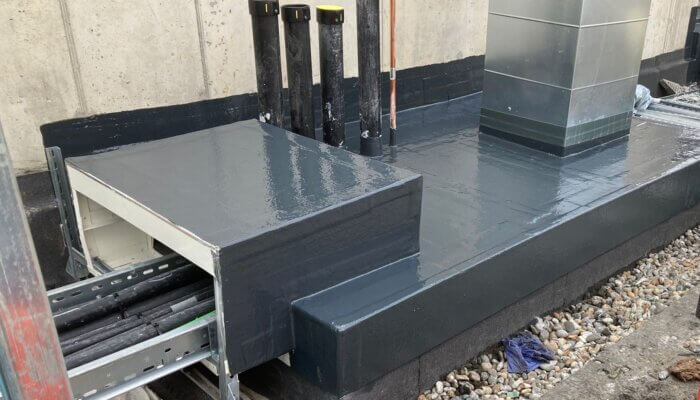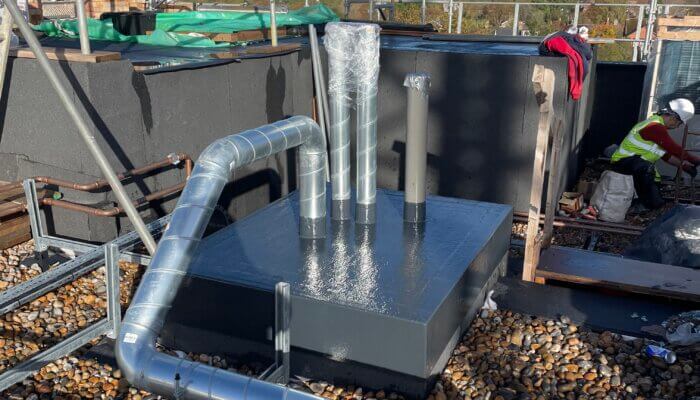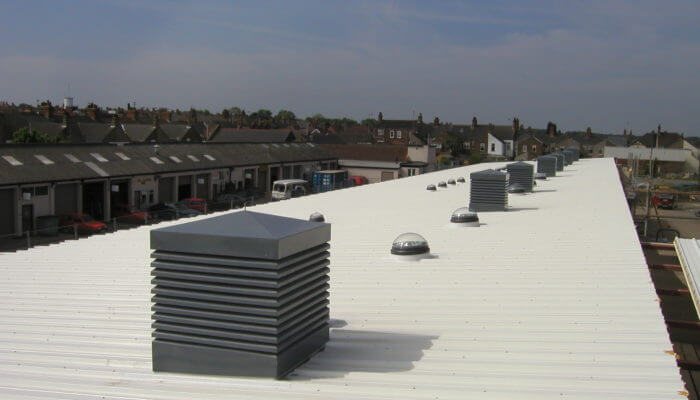Commercial roofing and commercial roof repairs are completely different from the residential roofing sector. In this article, we’ll be answering everything from what a commercial roof is, what they’re made of and the options available to you to when they need repairing or replacing, how to weatherproof them and the best materials to use.
What is a commercial roof?
A commercial roof is the top covering of your business’ premises. A lot of, commercial roofs have a flat slope and the type of materials used tends to differ – we’ll cover this in detail a little later on.
Here at Jones Weatherproofing, we’re the industry’s go-to for all things roofing. Our weathering options are endless, our approach is flexible, and our design selection’s comprehensive. To find out more, check out our design and build services.
What are the different types of commercial roofs?
Generally speaking, commercial roofs can be split into two categories: flat or pitched.
Flat roofs need to be finished with a layer of weatherproofing felt or a single-ply membrane, and, despite their name, they aren’t actually 100% flat – they do have a slight fall. Flat roofs tend to be more cost-effective as less labour is needed and materials are usually cheaper.
Made up of at least two slopes that create a peak, pitched roofs are usually more durable than flat roofs and have additional benefits such as extra storage space and potentially more efficient weatherproofing qualities.
What variations of commercial roofs are there and what are they made of?
Some of the most common types of commercial roofs include; felt roofing, liquid roofing, single-ply roofing, metal roofing, slating and tiling, green roofs and rooflights and skylights.
In terms of weatherproofing a roof, acrylic and silicone are a couple of the most used membrane materials. Acrylic membranes are usually on the cheaper side and have the added benefit of being able to give them a re-coat later down the line. One thing worth noting though, is acrylic polymers don’t operate as well when water pools, so if you’ve got a flat roof, it might not be the best option for you.
Silicone membranes generally offer better resistance to water and are relatively easy to apply however, unlike their acrylic counterpart, they can’t be re-coated with any other liquid products.
Roof penetrations
Some common commercial roof penetrations include; soil vent pipes, hot pipes from boiler flues for example, electrical cables for air-con units, and extraction ducting.
Penetrations are often needed to house important installations on the outside of a building where space is at a premium inside, however, because they can compromise your roof’s weatherproofing qualities, they should be implemented carefully and not without speaking to your weatherproofing installer first.
When it comes to roof penetrations and weathering systems Jones Weatherproofing is the expert. We’ve built a name for ourselves designing, building and installing first-class solutions that are structurally sound and weatherproof, and everything we do is bespoke to you. To learn more, take a look at our roof penetration and vertical penetration solutions.
What is the best material for a commercial flat roof?
Because flat roofs don’t disperse water quite as easily as pitched roofs, extra attention needs to be given to its waterproofing properties.
Popular weatherproofing solutions include GRP roofing systems, liquid coatings, single-ply membranes, EPDM rubber, reinforced bituminous membranes, asphalt, and waterproof paint toppings. Above all, however, GRP roofing systems offer the best performance and durability and should be the first choice for commercial roof repairs.
When should I replace my commercial roof?
There isn’t a set answer for this. Commercial roofs can last anywhere from 5 to 100 years depending on the type of materials used, quality of installation, and whether or not you’ve maintained adequate weatherproofing measures (like re-coating your membrane, for example).
Outside of wanting a new roof for aesthetic reasons, an internal leak or evident external damage is an obvious sign repair or replacements are needed.
Before you decide whether to replace the whole roof or just patch up a problem area, weigh up the pros and cons.
While on the one hand simply repairing your roof will be cheaper, it could be more costly in the long-run if a) it’s not done by an expert, and b) you end up having to replace the whole thing down the line anyway.
On the flip side, replacing your whole roof will undoubtedly result in a more structurally sound and weatherproof surface, however, it will also cost substantially more.
Our approach
At Jones Weatherproofing we opt to repair over replace to give our clients the best service, price and roof-life while safely postponing full replacements for up to another 25 years.
If your end laps are rusting we’ll seal over the laps, and if it’s your cladded structure that’s under the spotlight we’ll line the gutters, create new detail valley gutters, and then seal them over your existing ones.
The only type we’d instinctively advise to replace are felt roofs, and we’d do this with our premium replacement service which includes GRP which offers an incredibly resilient solution that can increase the longevity of a flat roof.
Are commercial roof repairs covered by building insurance?
Building insurance covers the cost of repairing or replacing your roof if a natural disaster (like a storm, fire or flood) hits or if it’s damaged by vandalism of subsidence.
How much you’re covered for will vary from provider-to-provider and you may have to pay an excess, but the money you recoup from your building insurance cover could make the cost of repairing or replacing your roof considerably less than you originally thought.
When it comes to the condition of your roof, cost should be secondary. Leaving structural concerns unattended will not only cost more to fix in the long-run but, worst case, could put your employees and customers in harm’s way too.
If you want to chat to one of our technical experts about your next roofing project or need some practical and impartial advice, get in touch with the team on 01922 712111 or contact us here.


